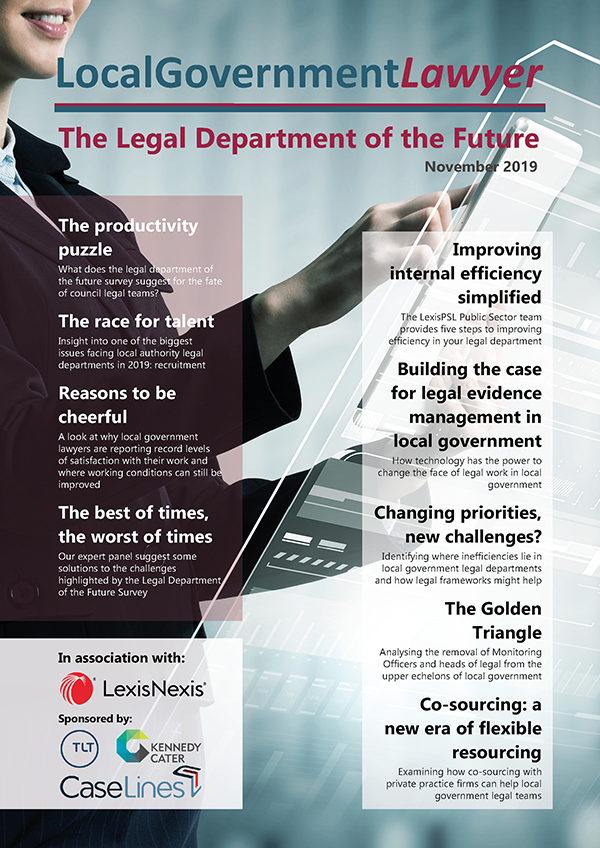Co-sourcing: a new era of flexible resourcing
Bill Hull examines the opportunities for hard-pressed local government legal teams offered by co-sourcing with private practice firms.

As an industry with increasing and persistent pressures to improve efficiencies, the local government legal landscape is more scattered with shared services arrangements than ever before. Whether instead of, or to supplement, existing shared service arrangements, building stronger yet sufficiently flexible relationships with private practice firms is proving a welcome option.
There has been no dramatic advancement in the delivery of legal services across local government in the past five years. Senior managers remain under great pressure to achieve significant savings against budget cuts whilst meeting increased demand and requirements to improve delivery. In this environment the challenge of recruiting and retaining staff is more difficult than ever, alongside operating a supportive working environment that encourages collaboration and up-skilling of teams and individuals.
Across the board, local government departments continue to adapt. So what does the local government legal department landscape look like in 2019?
Many authorities have embraced, at least in part, the varying forms of shared services solutions that are available across the country. The latest figures from the Local Government Association estimates there to be 626 shared services partnerships across local government, generating savings to the taxpayer of over £1.34bn – some £200m of which was saved in 2018/2019 alone.
There are many forms of shared services arrangements across local government for the provision of back-office services. For legal departments, perhaps the most common structure is in the form of collaboration with other authorities and/or public bodies. Successful models include:
- LGSS Law, established as an alternative business structure in 2015 and wholly owned by Cambridgeshire and Northamptonshire County Councils along with Central Bedfordshire Council;
- EM Lawshare, a significant consortium of more than 180 public bodies capable of procuring discounted legal services through its legal framework; and
- Orbis Public Law, a partnership between the legal services of Brighton & Hove City Council, East Sussex County Council and West Sussex County Council.
Shared services arrangements can be effective and successful. Over the past decade there has been sustained growth in such schemes. With proper governance and management, they are proven to increase efficiencies and achieve savings in shared knowledge and resource.
However, implementing such measures can also be disproportionately costly and disruptive, with the potential for creating a disconnect between teams and authorities. Sometimes, while authority collaborations can increase available resource for particular requirements, they do not give access to the broader or more specialist skills that are required. As shared service arrangements represent a fixed resource they are not always as efficient as calling on additional resource only when it is required.
An additional option comes in the shape of establishing a strong co-partnering relationship with private practice law firms.
It is acknowledged that there has historically been a general reluctance for local government to externalise legal work (either in part or its entirety) to private practice. The main concerns are often cited as loss of knowledge and missed opportunities to up-skill in-house teams, unease about internal governance procedures not being properly adhered to, and an overall loss of ownership over a project or internal relationship.
However, it is accepted that local government legal departments are unable to service all of their needs by themselves. The main drivers for reaching out to private practice for support are most commonly capacity issues and lack of expertise in specialist, complex areas.
A flexible alternative
Co-sourcing is a flexible resourcing tool designed to counter these concerns by the public sector; it was specifically designed for and developed in conjunction with local government. Quite simply, it is the provision of high quality, additional legal resource which supports in-house teams by delivering the right level of resource at the right time.
When applied, it allows for the delivery of swift, flexible resource; providing collaboration with a team that truly understands local government and the challenges faced on a day-to-day basis, while building resilience within client teams.
Underpinning the co-sourcing model is the inherent ability for the client to retain control of the instruction at all times and for private practice lawyers to seamlessly become an extension of the client team. It has evolved to ensure that quality and costs are guaranteed, with stringent processes built into service delivery to ensure output is aligned with client needs.
Importantly, provision is made to safeguard knowledge, with all learning captured, shared and retained all the while encouraging the up-skilling of in-house teams.
Ultimately, a true collaboration between lawyer and client is developed.
Key features:
- A suite of best practice processes for end-to-end service covering conflict, scope, risk, delivery, lessons learned and management information
- A true co-sourcing relationship
- A pro-active, open approach to client feedback
- Legal services to cover a range of scenarios
- Capture and transfer of knowledge to empower client teams
- Access to niche area specialists when required
Co-sourcing in practice
Case study 1: we have a co-sourcing arrangement in place with a London local authority where we regularly work with and sit alongside the in-house team. Working in this manner allows documents to be shared and stored on the in-house system and are accessible to all who require them when they are needed. It ensures a core team are on hand to support when workflows are high. This helped recently when there was a delay in the authority replacing in-house team members who had departed.
Case study 2: whilst designed for local government, co-sourcing is capable of application across the public sector. We have implemented such measures with a central government body for over two years. Benefitting from co-sourcing’s best practice processes, the ease of which instructions can be made ensures at all times our client can focus its own resource where it is most needed.
Our experience in co-sourcing in local government has been that it enables and strengthens the in-house team, whether it is by providing additional resources to support on day-to-day matters or to provide support for those specialist areas of law (such as tax, banking or renewable energy) which any in-house team may not routinely provide. Co-sourcing can flex with the requirements of in-house teams by working closely with them and understanding what their particular challenges are.
Conclusion
Alternative models of service delivery are fast becoming the new normal for local government. The overwhelming benefit of the co-sourcing route is that it allows the in-house legal team to remain a dedicated resource but also provides the flexibility needed to manage a varied and fluctuating caseload.
Bill Hull is a partner and Joint Head of Public Sector at TLT. He can be contacted on +44 (0)333 006 0321 or by email at This email address is being protected from spambots. You need JavaScript enabled to view it.
TLT is a top 50 full service UK law firm. Active in the public sector for over 20 years with a proven history of helping local government achieve efficiencies and unlock investment, building genuine sector expertise across the full range of legal services.
 This article appeared in the Legal Department of the Future report, published in November 2019. To read or download the full report, please click on the following link: http://www.localgovernmentlawyer.co.uk/legal-dept-of-the-future
This article appeared in the Legal Department of the Future report, published in November 2019. To read or download the full report, please click on the following link: http://www.localgovernmentlawyer.co.uk/legal-dept-of-the-future

